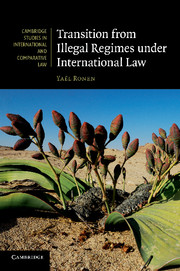Book contents
- Frontmatter
- Contents
- Abbreviations
- Acknowledgements
- Foreword
- Table of treaties
- Table of case law
- Table of UN documents
- Table of domestic legislation and similar acts
- Table of documents of intergovernmental organizations
- 1 Introduction
- 2 The case studies
- 3 The obligation of non-recognition
- 4 The effect of transition on treaty relations of the territory
- 5 The effect of transition on the domestic law of the territory
- 6 The effect of transition on settlers implanted by illegal regimes
- 7 The effect of transition on land titles
- 8 Conclusions: Non-recognition and transition
- Selected bibliography
- Index
- References
6 - The effect of transition on settlers implanted by illegal regimes
Published online by Cambridge University Press: 05 July 2011
- Frontmatter
- Contents
- Abbreviations
- Acknowledgements
- Foreword
- Table of treaties
- Table of case law
- Table of UN documents
- Table of domestic legislation and similar acts
- Table of documents of intergovernmental organizations
- 1 Introduction
- 2 The case studies
- 3 The obligation of non-recognition
- 4 The effect of transition on treaty relations of the territory
- 5 The effect of transition on the domestic law of the territory
- 6 The effect of transition on settlers implanted by illegal regimes
- 7 The effect of transition on land titles
- 8 Conclusions: Non-recognition and transition
- Selected bibliography
- Index
- References
Summary
Introduction
Illegal regimes characteristically take measures to change the demographic composition of the territory under their control. One common strategy is the forced removal of local inhabitants from the territory. The other main strategy is the transfer into the territory of a settler population loyal to the illegal regime's government, and the subsequent granting of residence or nationality in the territory to this population. This chapter concerns the response of the post-transition regime to this second strategy, which was prevalent to different extents in most of the case studies.
At the time of transition from the illegal regime to the new, lawful regime, it is not surprising that there are calls, at various levels, for the physical removal or expulsion of settlers from the country, or at least for their exclusion from the body politic. These calls represent a variety of interests and sentiments. Common to most situations is resentment towards the settlers as representatives of the exploiting regime, and a quest for retribution. This sentiment is not limited to situations where an illegal regime ends; it is common to many regimes following political conflict. Another motive for advocating expulsion is the concern of the post-transition regime that despite formal withdrawal, the previous, illegal regime will utilize its diaspora to continue dominating the territory under the new regime.
- Type
- Chapter
- Information
- Transition from Illegal Regimes under International Law , pp. 186 - 245Publisher: Cambridge University PressPrint publication year: 2011



